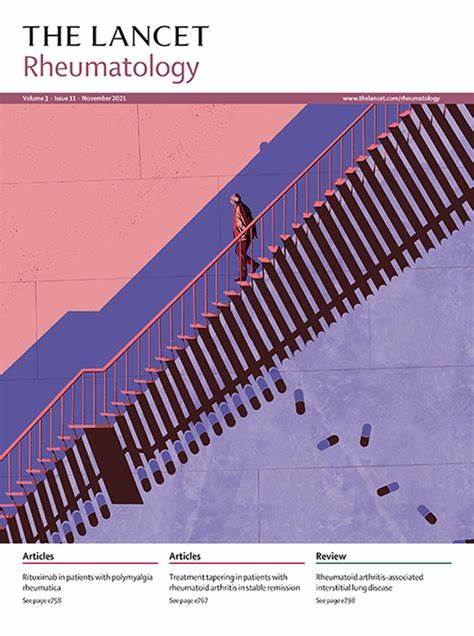识别 IgG4 相关疾病的红色信号:欧洲罕见结缔组织病国际参考网络框架。
IF 15
1区 医学
Q1 RHEUMATOLOGY
引用次数: 0
摘要
IgG4 相关疾病是一种罕见的纤维炎症。及时识别是开始治疗和防止器官损伤的基础。诊断和分类标准主要供具有 IgG4 相关疾病专业知识的临床医生使用。初级保健医生和不具备 IgG4 相关疾病专业知识的专科医生缺乏对疾病的认识仍然是导致诊断延误的主要原因。我们的目标是找出可能增加初级和二级医疗机构对 IgG4 相关疾病怀疑的信号。一个由欧洲罕见结缔组织病参考网络(ERN-ReCONNET)IgG4 相关疾病专家、患者代表和初级保健医生组成的工作组,通过系统的文献检索和共识度练习,得出了 IgG4 相关疾病的潜在信号。专家们对以下五个红旗征兆达成了 100% 的一致意见:一个或多个器官系统肿胀;胰腺和胆管受累;血清 IgG4 增高;IgG4+ 浆细胞组织浸润;以及闭塞性静脉炎。IgG4 相关疾病的红旗旨在用于初级和中级医疗,以改善向专业中心的转诊,并及时进行早期诊断。本文章由计算机程序翻译,如有差异,请以英文原文为准。
Identification of red flags for IgG4-related disease: an international European Reference Network for Rare Connective Tissue Diseases framework
IgG4-related disease is a rare fibroinflammatory condition. Prompt recognition is fundamental to initiate treatment and to prevent organ damage. Diagnostic and classification criteria are primarily intended for use by clinicians with established expertise in IgG4-related disease. Absence of disease awareness among primary care physicians and specialists without expertise in IgG4-related disease remains the main cause of diagnostic delay. We aimed to identify red flags that might increase the suspicion of IgG4-related disease in primary and secondary care settings. A task force of experts in IgG4-related disease from the European Reference Network for Rare Connective Tissue Diseases (ERN-ReCONNET), patient representatives, and primary care physicians derived potential red flags for IgG4-related disease through a systematic literature search and a level of agreement exercise. Five red flags reached 100% agreement among experts: swelling in one or more organ system; pancreatic and biliary tree involvement; increased serum IgG4; IgG4+ plasma cell tissue infiltration; and obliterative phlebitis. Red flags for IgG4-related disease are intended for use in primary and secondary care to improve referral to centres of expertise and prompt early diagnosis.
求助全文
通过发布文献求助,成功后即可免费获取论文全文。
去求助
来源期刊

Lancet Rheumatology
RHEUMATOLOGY-
CiteScore
34.70
自引率
3.10%
发文量
279
期刊介绍:
The Lancet Rheumatology, an independent journal, is dedicated to publishing content relevant to rheumatology specialists worldwide. It focuses on studies that advance clinical practice, challenge existing norms, and advocate for changes in health policy. The journal covers clinical research, particularly clinical trials, expert reviews, and thought-provoking commentary on the diagnosis, classification, management, and prevention of rheumatic diseases, including arthritis, musculoskeletal disorders, connective tissue diseases, and immune system disorders. Additionally, it publishes high-quality translational studies supported by robust clinical data, prioritizing those that identify potential new therapeutic targets, advance precision medicine efforts, or directly contribute to future clinical trials.
With its strong clinical orientation, The Lancet Rheumatology serves as an independent voice for the rheumatology community, advocating strongly for the enhancement of patients' lives affected by rheumatic diseases worldwide.
 求助内容:
求助内容: 应助结果提醒方式:
应助结果提醒方式:


